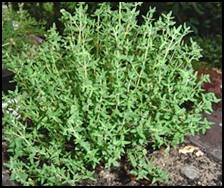You entered Serpyllum, the more common name is...

Thyme
SCIENTIFIC NAME:(Thymus vulgaris)
Thyme has numerous woody stems ranging from 6 to 10 inches high. It is covered in fine hair and has flat round leaves that grow in pairs. Thyme's flowers are small bluish-purple, two-lipped and grow in clusters. The flowers bloom from May to September, and like the rest of the plant, is heavily scented.
Common Names:
Common Thyme, Garden Thyme, Serpyllum, Tomillo

Uses:
A poultice can be made from the leaves of thyme that will combat all forms of inflammation and infection. Rub the extract between the toes daily for athlete's foot. Used externally, the extract can be used daily for crabs, lice, and scabies. Taken internally by standard infusion, thyme is a first-rate digestive, febrifuge and liver tonic. Taken as a tonic it is said to calm the nerves and acts as an anti-spasmodic. Gargling with a tea brewed from leaves, and flowers is said to cure halitosis. Thyme baths are said to be helpful for nervousness, rheumatic problems, bruises, swellings, and sprains. The salve made from thyme can be used for shingles. Thyme can repel insects and moths. It is said to aid the growth of eggplant, tomatoes, and potatoes when planted nearby in the garden. Thyme is a favorite of bees. Thyme is also a fantastic herb to cook with.Applications:
Infusion:
steep 1/2 tsp. fresh herb or 1 tsp. dried herb in 1/2 cup water for 3 to 5 minutes. Take 1 to 1 1/2 cups per day, a mouthful at a time.
Oil:
take 10 drops, 3 times per day.
Wash:
make a strong decoction and add to the bath water.
Warnings:
Use Thyme sparingly as excessive internal use of thyme can lead to symptoms of poisoning and to overstimulation of the thyroid gland. Please use caution.
Avoid therapeutic doses of thyme and thyme oil in any form during pregnancy because the herb is a uterine stimulant.
Thyme oil can irritate mucous membranes. Always dilute it well if used.






